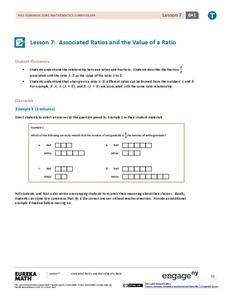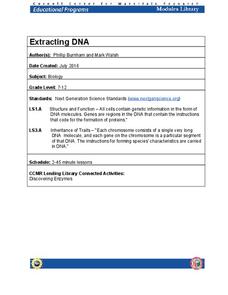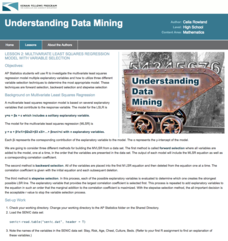CK-12 Foundation
Free Body Simulation
To show the magnitude and direction of all forces acting upon an object, scientists use a free body diagram. This simulation serves as an introduction to free body diagrams allowing scholars to build their own. Pupils select the proper...
EngageNY
Associated Ratios and the Value of a Ratio
Do ratios have values? The seventh lesson in a series of 29 introduces the value of a ratio. Pupils create associated ratios to a given ratio. They also describe the fraction associated to the ratio as the value of the ratio.
Education Development Center
Making Sense of Unusual Results
Collaboration is the key for this equation-solving lesson. Learners solve a multi-step linear equation that requires using the distributive property. Within collaborative groups, scholars discuss multiple methods and troubleshoot mistakes.
Education Development Center
Interpreting Statistical Measures—Class Scores
Explore the effect of outliers through an analysis of mean, median, and standard deviation. Your classes examine and compare these measures for two groups. They must make sense of a group that has a higher mean but lower median compared...
Cornell University
Extracting DNA
Uncover the basics of DNA structure through exploration activities. Collaborative groups build DNA models and recreate the process of replication. Then, using plant cells such as peas or strawberries, they extract a DNA sample.
Curriculum Corner
Holidays Around the World
Let's focus on a holiday from around the world! Young researchers choose a holiday from somewhere around the world, and conduct research to answer questions about the holiday. It can be used anytime during the year!
Chemistry Collective
Virtual Lab: Alcohol Density Problem
Assume the role of Canadian border control! The percent of alcohol and density of a solution are related. Young scholars use this fact to classify solutions by their alcohol content to determine if they meet Canadian import laws.
Science 4 Inquiry
The Ins and Outs of Photosynthesis
The most important chemical process on Earth is photosynthesis. Scholars explore the changes in the gases in our atmosphere as life on Earth developed. They create a model of photosynthesis and consider simple questions.
Chemistry Collective
Osmotic Pressure: Spontaneous Balloon Popping
Visualize osmosis using an interactive activity. As learners monitor a simulation, they witness the particle movement through the membrane. A balloon represents the cellular membrane and 'pops' as osmosis creates an imbalance of particles.
Harper Collins
The World of Ramona
Bring the fun and whimsy of Beverly Cleary into your classroom with a teaching guide created to accompany the Ramona series. The guide offers several ideas for classroom use, including independent reading, reading aloud, and literature...
Nuffield Foundation
Microscale Investigations of Catalase Activity in Plant Extracts
Use indirect measurements to monitor metabolic activity in plant cells. Scholars understand that cells with a higher metabolic rate have a higher concentration of catalase enzyme. They use this information to compare metabolic rates of...
Gilder Lehrman Institute of American History
Harriet Beecher Stowe Sends Uncle Tom’s Cabin to Victoria and Albert, 1852
Harriet Beecher Stowe's plea for abolition is not only laid plain in her acclaimed novel, Uncle Tom's Cabin, but in her written correspondence as well. High schoolers read a letter written by Stowe to Prince Albert and Queen Victoria to...
PBS
Sherpas on Everest
Every successful climb of Mount Everest can be attributed to the assistance of the local Sherpas. A short, informative article explains the history behind the Sherpa's involvement in Mount Everest expeditions, the physiological reasons...
Kenan Fellows
Multivariate Least Squares Regression Model with Variable Selection
The risk of contracting an infection in the hospital is low, but it does happen. Learn what risk factors have the highest correlation with hospital-acquired infections in the final lesson of a three-part series. Using the open source R...
Planet e-Book
Pride and Prejudice
Elizabeth Bennet and Mr. Darcy have captured the heart of readers since Pride and Prejudice was first published in 1813. An eBook version of Jane Austen's novel gives learners a chance to read about the classic characters.
Lee & Low Books
First Come the Zebra Teacher’s Guide
Accompany a reading of First Come the Zebra written and illustrated by Lynne Barasch with a teacher's guide equipped with before reading, vocabulary, and after reading activities. Additional social studies, science, music, art, math, and...
Other popular searches
- Writing a Summary
- Story Summary
- Chapter Summary
- Summary Writing
- Article Summary
- Character Summary
- Book Summary
- Five Number Summary
- Plot Summary
- Math History Summary
- Writing a Summary Paragraph
- Second Grade Story Summary

















